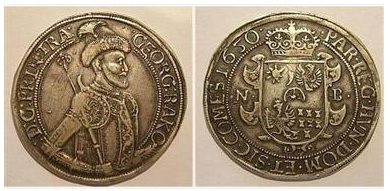TRANSYLVANIAN COINS
(Numis)
RAKOCZI GEORG II 1648-1660

Gyorgy Rakoczi II (January 30, 1621–June 7, 1660), was elected prince of Transylvania during his father’s (Gyorgy Rakoczi I) lifetime (19 February 1642). On ascending the throne (October 1648), he allied himself, in the beginning of 1649, with the Cossack hetman, Bohdan Khmelnytsky, Vasile Lupu of Moldavia and Matei Basarab of Wallachia to realize his father’s Polish ambitions. He took Cracow and entered Warsaw as the ally of Charles X Gustav in 1657. But after his allies withdrew, his forces were defeated in July 1657 by the Polish army. The Transylvanian diet, at the command of the Porte, deposed him two times, but reinstated him each time. The Turks invaded Transylvania, and Rakoczy died at Nagyvarad of the wounds received at the battle of Gyalu (Gilău), in May 1660.
Coins minted:
1648 – taler
1649 – 10 ducat gold coin ; ducat; taler
1650 – 10 ducat gold coin ; ducat; 1/4 ducat; taler
1651 – 10 ducat gold coin ; ducat; taler; 1/4 taler
1652 – 10 ducat gold coin
1653 – 10 ducat gold coin ; ducat; 1/4 ducat; 4 taler silver ; taler; dinar
1654 – 10 ducat gold coin ; 7 ducat gold coin / ducat; taler; 1/2 taler
1655 – 10 ducat gold coin ; ducat; taler
1656 – 10 ducat gold coin ; ducat; taler; 1/2 taler; 1/4 taler
1657 – 13 ducat gold coin ; 12 ducat gold coin / 10 ducat gold coin ; ducat; taler
1658 – 10 ducat gold coin ; taler
1659 – 10 ducat gold coin ; double taler / taler; 1/2 taler
1660 – 10 ducat gold coin ; taler
RAKOCZI GEORG II - TALER 1650 (photo)

RAKOCZI GEORG II - DUCAT 1657 (photo)

RAKOCZI GEORG II - TALER 1660 (photo)

BATHORI CHRISTOPH 1576-1585

Bathori Christoph – became prince of Transylvania after his brother Bathori Stephan became the king of Poland, but the power structure did not change. As noted, the Transylvanian chancellery in Cracow, headed by Berzeviczy Marton, exercised greater authority than the one in the principality under Kovacsoczy Farkas.
Between 1581 and 1586, the government of Transylvania was firmly in the hands of Bathori Stephan, King of Poland, and after the death of Bathori Christoph, the Cracow chancellery became the sole locus of decision-making.
Coins minted:
10 ducat 1577
5 ducat 1577
4 ducat 1577
2 ducat 1577
1 1/2 ducat 1577
ducat 1577
taler 1577
ducat 1578
ducat 1579
1/4 ducat 1579
denar 1579
4 ducat 1580
taler 1580
ducat 1580
taler klippe 1580
10 ducat 1583
5 ducat 1583
BATHORI CHRISTOPH - 10 DUCAT 1577 (photo)

BATHORI CHRISTOPH - DUCAT 1577 (photo)

CHRISTOPH BATHORI - DUCAT 1579 (photo)

CHRISTOPH BATHORI - TALER 1580 (photo)

CHRISTOPH BATHORI - DUCAT 1580 (photo)

BATHORY SIGISMUND 1581-1602

Sigismund Bathory, was elected prince of Transylvania in 1581at the age of 9, so the government was entrusted to a regency until 1588. He’s decision to join the league of Christian princes against the Ottomans is very criticized by his opponents who threatened him with deposition. After letting his cousin Bathory Boldizsar to rule for a short while, He returns and he executes most of his opponents. In April 1598 Sigismund resigned again as prince of Transylvania in favor of Emperor Rudolf II, reversed his decision in October 1598, and then resigned again in favor of Cardinal Andrew Bathory , his cousin. In February 1601 the diet of Cluj (Klausenburg) reinstated him, but again he was driven out by Michael the Brave and general Giorgio Basta, never to return. He died at Prague in 1613.
He minted a large variety of gold and silver coins:
10 ducat gold – 1583, 1590, 1598
9 ducat gold – 1598
gold ducat – 1581, 1582, 1583, 1584, 1585, 1586, 1587, 1588, 1589, 1590, 1591, 1592, 1593, 1594, 1595, 1596, 1597, 1598, 1599
double taler klippe – 1589
klippe of one and a half talers – 1589, 1592
taler – 1589, 1590, 1591, 1592, 1593, 1594, 1595, 1596, 1597, 1598, 1599
1/2 taler – 1589, 1593, 1594, 1595, 1597
3 groschen / triplu gros – 1594, 1596, 1597, 1598
silver solidus – 1590
copper solidus – 1590
denar – 1590, 1591
SIGISMUND BATHORY - DUCAT 1582 (photo)

SIGISMUND BATHORY - DUCAT 1583 (photo)

SIGISMUND BATHORY - DUCAT 1585 (photo)

SIGISMUND BATHORY - DUCAT 1585 (photo)

SIGISMUND BATHORY - DUCAT 1593 (photo)

SIGISMUND BATHORY - DUCAT 1597 (photo)

SIGISMUND BATHORY - TALER 1589 (photo)

SIGISMUND BATHORY - TALER 1590 (photo)

SIGISMUND BATHORY - TALER 1591 (photo)

SIGISMUND BATHORY - TALER 1592 (photo)

SIGISMUND BATHORY - TALER 1595 (photo)

SIGISMUND BATHORY - TALER 1596 (photo)

SIGISMUND BATHORY - TALER 1597 (photo)

SIGISMUND BATHORY- 3 GROSCHEN 1597 (photos)

Bathori Sigismund granted to the town of Kronstadt the right to mint coins in 1602. But the town mint was already issuing coins one year earlier with the towns coat of arms on the rev. of the coins. After a 10 years break, during the fight between Bathori Sigismund and Radu Serban, the town mint started to issue coins again, until 1615.
Coins minted:
taler klippe 1601
1/2 taler (gulden) 1601
10 ducat 1612
ducat 1612
taler 1612
1/2 taler (gulden) 1612
groschen (gros) 1612
ducat 1613
groschen (gros) 1613
copper groschen (gros de cupru) – 1613
groschen klippe (gros klippe) – 1614
KRONSTADT taler klippe 1601 (photo)

KRONSTADT DUCAT 1612 (photo)

KRONSTADT GROSCHEN 1613 (photo)

BETHLEN GABRIEL 1613-1629

During he’s reign was minted the highest amount of coins in Transylvania.
On 23 October, 1613, Gabriel Bethlen became Prince of Transylvania. Four days after Bethlen’s election, Gabriel Bathori was murdered, reportedly by hajdus in the pay of Ghiczy Andras. They disposed of the corpse in the Pece brook.
The style of governance in Transylvania underwent radical change, as Bethlen introduced orderly and sensible administration. Despite his rational and sustained pro-Turkish stance, the newly elected Prince failed to develop harmonious relations with Constantinople. He obtained an athname from the sultan endorsing Transylvania’s right to freely elect its prince, but this offered no guarantees and came with a price: in exchange for confirming Gabriel Bethlen as prince, the Porte demanded the transfer of Lippa and Jenő.
The claim put Bethlen in a quandary. Pasha Skender’s forces were already encamped on the border, and the newly elected Prince could not risk an attack. He initiated negotiations in Constantinople, and the surrender the fortresses was postponed, but only until the spring of 1616, when he had to gave up Lippa to the pasha of Temesvár (Timisoara). The surrender of the fortress represented a low point in the history of Transylvania.
Bethlen reorganized the domestic economy and monetary system, all without the involvement of the diet. The estates occasionally debated the monetary reforms, but only after these had come into effect, and usually in order to request that the new currency be accepted for taxes. Otherwise, the Prince bypassed the estates in conducting the affairs of state, and in generating the resources necessary for the functioning of a modern principality.
The state forged by Gabriel Bethlen has earned divergent assessments. It has been characterized as absolutist, or a peculiar variant of feudal centralism. However, the prince clearly did not adopt the orthodox, western European model of absolutism. The most striking difference was in the Transylvanian model of taxation: the imposition of taxes without reference to the taxpayers’ material circumstances sharply differentiates the Transylvanian political system from the typical forms of absolutism.
Coins minted:
1613 – gold of 2 ducats, one ducat
1614 – one ducat gold, silver denar
1615 – gold of 2 ducats, one ducat
1616 – gold of 10 ducats, gold of 5 ducats, one ducat gold
1617 – one ducat gold, silver groschen klippe, silver groschen
1618 – one ducat gold
1619 – gold of 10 ducats, one ducat gold, 1/4 ducat gold
1620 – gold of 10 ducats, one ducat gold coin, 1/4 ducat gold, silver taler, silver groschen, silver denar
1621 – gold of 10 ducats, one ducat gold, double taler, taler, silver breitgroschen, silver groschen, silver denar
1622 – gold of 10 ducats, one ducat gold coin, silver double taler, silver double taler klippe, silver taler, 1/2 silver taler, silver 3 kreuzer, silver breitgroschen, silver groschen, silver denar, thick silver denar, silver obol
1623 – one ducat gold, 3/4 silver taler klippe, silver 24 kreuzer, silver dutka klippe, silver dutka, silver breitgroschen, silver groschen, silver 3 kreuzer, silver 2 kreuzer, silver denar, silver obol
1624 – one ducat gold, 1/2 silver taler klippe, silver breitgroschen, silver groschen klippe, silver groschen, silver 3 kreuzer, silver denar
1625 – gold of 5 ducats, one ducat gold, silver breitgroschen, silver groschen, silver denar
1626 – one ducat gold, 1/4 gold ducat, klippe of 4 silver talers, double silver taler, klippe of double silver taler, silver taler, silver breitgroschen, silver groschen, silver denar
1627 – gold of 4 ducats, gold of 3 ducats, gold of 2 ducats, one ducat gold, 1/4 gold ducat, silver 4 talers coin, silver klippe of 3 1/2 talers, silver klippe of 3 talers, silver 3 talers coin, silver klippe of 2 1/2 talers, double silver taler, double silver taler klippe, silver klippe of 1 1/2 talers, silver taler, silver breitgroschen, silver groschen, silver denar
1628 – gold of 10 ducats, gold of 2 ducats, one ducat gold, 1/4 gold ducat, silver klippe of 3 talers, silver 3 talers coin, silver klippe of 2 1/2 talers, double silver taler, double silver taler klippe, silver klippe of 1 1/2 talers, silver of 1 1/2 taler, silver taler, silver 1/2 taler, silver breitgroschen, silver groschen
1629 – one ducat gold, silver 3 talers coin, silver klippe of 3 talers, silver klippe of 2 talers, silver taler, silver 1/2 taler, silver breitgroschen, silver denar
1630 – one ducat gold, silver 1/2 taler, silver breitgroschen
BETHLEN GABRIEL - DUCAT 1614 (photo)

BETHLEN GABRIEL - DUCAT 1615 (photo)

GABRIEL BETHLEN - 10 DUCAT 1616 (photo)

GABRIEL BETHLEN - DUCAT 1616 (photo)

GABRIEL BETHLEN - DUCAT 1618 (photo)

GABRIEL BETHLEN - 10 DUCAT 1619 (photo)

GABRIEL BETHLEN - DUCAT 1620 (photo)

BETHLEN GABOR - DUCAT 1621 (photo)

BETHLEN GABOR - TALER 1621 (photo)

GABRIEL BETHLEN - DENAR 1621 (photo)

GABRIEL BETHLEN - DUCAT 1622 (photo)

GABRIEL BETHLEN - TALER 1622 (photo)

GABRIEL BETHLEN - 3 KREUZER 1622 (photo)

GABRIEL BETHLEN - GROSCHEN 1622 (photo)

GABRIEL BETHLEN - DUCAT 1623 (photo)

GABRIEL BETHLEN - 24 KREUZER 1623 (photo)

GABRIEL BETHLEN - BREITGROSCHEN 1623 (photo)

Gabriel Bethlen - groschen 1623 (photo)

GABRIEL BETHLEN - GROSCHEN 1624 (photo)

GABRIEL BETHLEN - BREITGROSCHEN 1625 (photo)

GABRIEL BETHLEN - GROSCHEN 1625 (photo)

GABRIEL BETHLEN - BREITGROSCHEN 1626 (photo)

GABRIEL BETHLEN - GROSCHEN 1626 (photo)

GABRIEL BETHLEN - DENAR 1626 (photo)

GABRIEL BETHLEN - DOUBLE TALER KLIPPE 1627 (photo)

GABRIEL BETHLEN - 1 1/2 TALERKLIPPE 1627 (photo)

BETHLEN GABRIEL - GROSCHEN 1627 (photo)

Gabriel Bethlen - Ducat 1628 (photo)

BETHLEN GABRIEL - GROSCHEN 1628 (photo)

GABRIEL BETHLEN - BREITGROSCHEN 1629 (photo)




